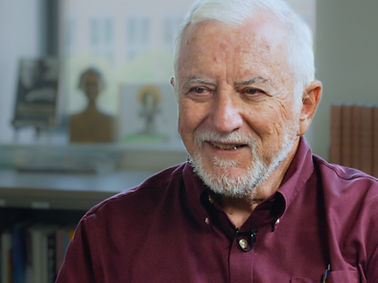THE HANK CENTER
FOR THE CATHOLIC INTELLECTUAL HERITAGE

VOLUME IV:
Dei Verbum at 60: Rediscovering the Word of God Ever Anew
01
Welcome to Nexus
Michael P. Murphy
.Kind greetings, and welcome to Nexus: Conversations on the Catholic Intellectual Tradition, a digital-age journal that amplifies and publishes scholarly dialogue taking place in the Hank Center here at Loyola University Chicago. We are pleased to report that Nexus is achieving what we hoped it would: providing fresh insight and sturdy scholarship in relatively fast, farm to table “turnaround” time...
02
Introduction to Dei Verbum at 60
Julian Sieber
Dei Verbum, one of the four Constitutions produced at the Second Vatican Council (1962–65), is a document of exceptional innovation and importance for the Catholic Church. Building upon its predecessor, Pope Pius XII’s 1943 Divino Afflante Spiritu, Dei Verbum is often recognized as one of the foundational documents for the opening up of the ‘scientific’ discipline of biblical scholarship to Catholic scholars...
03
Dei Verbum, Sixty Years On: The Story of the Document
an interview with Harold W. Attridge
Dr. Harold Attridge is a celebrated biblical scholar with a wide range of expertise. He is particularly well known for his research and many pioneering publications on the Gospel of John, the Epistle to the Hebrews, Hellenistic Jewish philosophy and literature, Nag Hammadi literature, the Dead Sea Scrolls, the Apocryphal Acts narratives and more...
04
Toward a Deeper Reception of the Council: Pope Francis’s Legacy Concerning the Word of God
Rita Ferrone
The renowned German scholar of Vatican II, Peter Hünermann, in an essay concerning the reception of the Second Vatican Council, succinctly summarized the meaning of “reception” in a few precise words: “‘to receive’ here means ‘appropriating something in such a way that we ourselves are shaped by what we receive.’ The gift becomes part of who we are.”...
05
The Word of God and the Way of Beauty: Dei Verbum and Via Pulchritudinis
Michael Peppard
Let me be clear up front: Dei Verbum, the Vatican II document about divine revelation, did not include one word about beauty or the arts. It was focused on the text of Scripture—part of a broad conciliar effort to make Roman Catholics in pulpits and pews more devoted to biblical texts as a mode of divine revelation. Looking back on its sixtieth anniversary, we can say that the effort was largely successful in two ways and disappointing in another...
06
Dei Verbum and the Ethical Critique of Sacred Scripture
Nathan Mastnjak
At the heart of Dei Verbum stands an expansive doctrine of revelation and emphasis on the human dimension of Scriptural inspiration. The document, however, leaves an important question unaddressed: to what extent does Dei Verbum’s theology of revelation and inspiration allow for the ethical critique of Scripture?...
07
Scriptural Pseudepigrapha in Dei Verbum
Thomas M. Bolin
Italo Calvino’s novel, If On a Winter’s Night a Traveler, explores the tenuous relationship between authors and texts. One of the characters in the novel has dedicated himself to permanently and definitively severing the author-text connection. Here’s how Calvino describes him...
08
Dei Verbum and a Catholic Theology of Pseudepigraphy
Julian Sieber
The practice of pseudepigraphy—writing under the guise of another author—was a common enough practice in the ancient Mediterranean and Near Eastern context from which the Christian Bible emerged. As most biblical scholars consider a good number of the texts of the Bible to be either pseudepigrapha (particularly the various letters of the New Testament) or falsely attributed (in the case of the canonical Gospels), ethical and interpretative problems may face many a modern reader inclined to condemn such practices as forgery...
09
Queering Revelation: Relating God’s Self-Communication to Liberating Praxis and Traditions
Miguel H. Díaz
Theology, I often tell my students, is a verb. It is an ongoing process that seeks to understand the life of Jesus and his practical and pastoral relevance across time. This perspective on theology resonates well with the Dogmatic Constitution on Divine Revelation, Dei Verbum, promulgated by Pope Paul VI on November 18, 1965...
10
Tradition and Transition
Mara Brecht
This essay addresses the ongoing significance of Dei Verbum for the practice of education at Catholic colleges and universities. In brief, I’ll attempt to answer two basic questions: What did Dei Verbum do? And what does that mean for teaching and learning? My proposal is that Dei Verbum lays the groundwork for a dialectical and personalist understanding of revelation and tradition...
11
Mysticism and Dei Verbum
Charles Hughes-Huff
Dei Verbum’s legacy is a battlefield of interpretation. On one side stand those who stress the human authors of Scripture and confine its meaning to the historical horizon of language, culture, and context. On the other side are those who stress divine authorship and read the Bible theologically, through the lenses of canon and creed. Both camps claim the Council. Both aim to define how the Church reads...
12
Science and Revelation
Ilia Delio, OSF
Revelation is the self-disclosure of God and lies at the heart of Christianity. The Word of God is spoken throughout all creation and, in a particular way, in the person of Jesus Christ. While we are familiar with Scripture and liturgy as modes of divine revelation, can aspects of modern science reveal God as well?...











